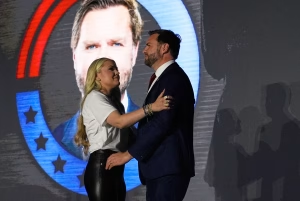On October 29, 2025, the University of Mississippi hosted a public event that garnered widespread attention due to an emotional interaction between Erika Kirk and Vice President JD Vance. The occasion marked Erika’s first public appearance as CEO of Turning Point USA following the death of her late husband, Charlie Kirk. Stepping into a highly visible leadership role, Erika addressed the audience with a message grounded in faith and perseverance, stating, “Go reclaim that territory, babe. The battle’s already won. God’s love conquers.” Her remarks reflected both a commitment to carry forward Charlie Kirk’s vision and a demonstration of personal resilience in the face of grief. The emotional intensity of the moment set the stage for a brief but significant exchange with Vance that quickly drew national attention.
During the event, Erika introduced JD Vance, noting that no one could truly replace her late husband but observing “some similarities” between Vance and Charlie. The two shared a brief hug onstage, an act that immediately became viral on social media. Public reactions were sharply divided: some criticized the gesture as overly intimate for a formal event, while others defended it as a genuine expression of empathy and human connection. The interaction sparked a broader conversation about the boundaries of public mourning, particularly for figures in political and activist spheres, and highlighted the ways in which emotional expressions by leaders are subject to intense scrutiny in highly visible forums.
To clarify the context of the hug, professional lip reader Nicola Hickling analyzed the interaction, emphasizing that it was entirely rooted in grief rather than any romantic or inappropriate intent. Hickling noted that Erika had whispered to her assistant moments before going onstage, “I can’t do this,” demonstrating her vulnerability at the time. During the hug, JD Vance reportedly told Erika, “I’m proud of you,” to which she responded, “It’s not gonna bring him back.” This analysis underscored that the moment was a raw, heartfelt expression of shared emotion, contextualizing it amid the polarized reactions online and illustrating how grief can be easily misinterpreted in public settings.
Despite Hickling’s clarification, the public remained divided on the incident. Critics argued that public figures should maintain strict professional boundaries during official events, while supporters praised Vance for showing compassion and supporting Erika during a highly emotional period. Erika herself has largely refrained from engaging in the social media debate, instead focusing on her new responsibilities as Turning Point USA’s CEO. In a Fox News interview, she acknowledged the constant presence of cameras, stating, “There have been cameras all over me. We deserve to have cameras in there,” highlighting her commitment to transparency while navigating personal grief and public leadership simultaneously.
The timing of the emotional exchange coincided with ongoing legal proceedings related to Charlie Kirk’s death, including the trial of his alleged killer, which has intensified public and media scrutiny. Despite this heightened attention, Erika has remained focused on the mission of Turning Point USA and the legacy of her late husband. Her public display of grief demonstrates the challenges that high-profile leaders face when balancing personal emotions with professional expectations, particularly in politically charged environments. The incident serves as a potent reminder of the human dimensions of leadership, revealing how private vulnerability can become a subject of national conversation in the age of social media.
In conclusion, the brief hug between Erika Kirk and JD Vance was a deeply human moment rooted in empathy, grief, and the shared experience of honoring Charlie Kirk’s legacy. While online reactions were polarized, the incident highlights the complexities faced by public figures in navigating personal loss under intense scrutiny. Erika’s focus remains on advancing the work of Turning Point USA, preserving her husband’s vision, and leading with integrity while managing the emotional weight of her personal tragedy. The event ultimately underscores the delicate balance between public responsibility and private emotion, illustrating how acts of compassion can resonate widely even as they are interpreted through the lens of social and political discourse.





